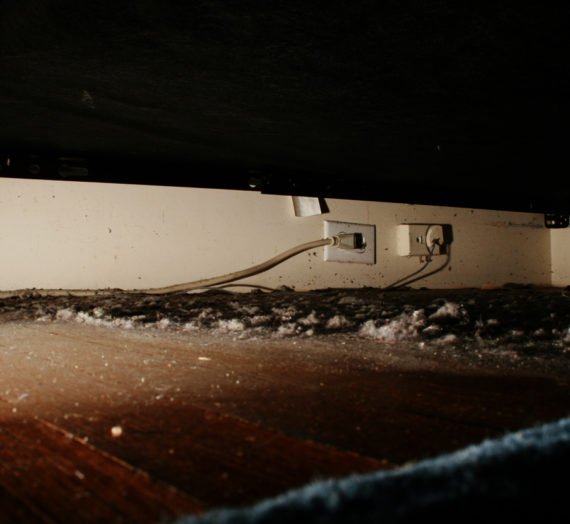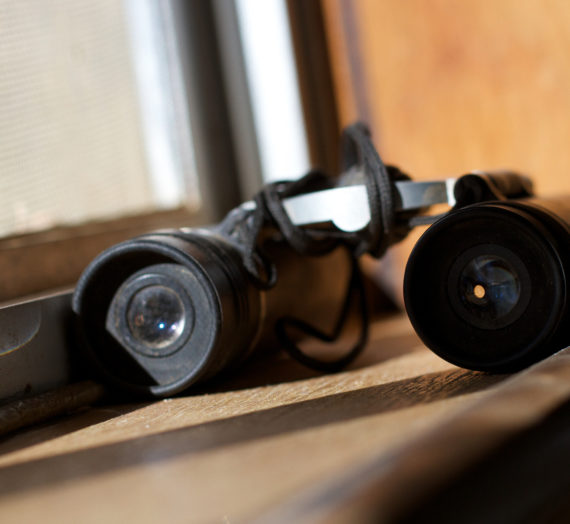First Rung
The first rung is the worst. It shouldn’t be, it doesn’t make sense, not when Kezia considers it, as it’s on the bottom, closest to the pavement, so if you fall you won’t exactly hurt yourself or break your ankle. Not like that time she jumped from the top of the stairs to the bottom, just to see if she could, and then Dad was mad at her as he had to miss Grandstand to take her to Casualty.

No, if you fall off the bottom rung you won’t break anything, but that’s not why it’s the worst. It’s because every time Grandad swings the gate and you’re standing on the wooden slat, the gate does something like slap up against the pole, and then shake, so every bone feels like it’s shivering inside you. Kezia doesn’t know the word for it, to describe what it feels like, just like she doesn’t know the word for the thin skin on the side of her head that makes shapes bloom in her eyes when she presses down hard, and the word for the thick silence that lies in the house when both her parents are in the same room – it’s black and heavy and lies like a rug, like Grandma’s old dog who snores and farts in front of Sherlock Holmes after tea. Only, she likes to cuddle Missy, when she isn’t too smelly, and when the silence between Mum and Dad creeps into the house she doesn’t want to cuddle it. She wants to run away.
But you have to stand on the first rung. It’s part of the game. Even Rosie knows it, and she’s only five. You stand on the first rung and then Grandad swings the gate. Then you move up to the next one.
It’s a good day when Grandad swings the gate for the whole game. Almost as good as the days Grandma gives them fifty pence to buy a pat of ice cream from Mr George Whippy Esquire in his pink and blue van with the huge plastic cone on the roof. A day when Grandad does all the swings and they get an ice cream is beyond special. Kezia can remember only one day like that recently and that was at the start of the summer holidays, when they’d first come to stay.
Today Grandad has done the first swing for Rosie – it always has to be Rosie who goes first as she the youngest. This has never felt fair to Kezia, but okay – but then Grandad leaves them to fetch salad from his allotment patch. It isn’t far, they can see him, and that’s the rule Grandma set. He can potter around the allotment all he wants and leave the girls on the gate, as long as they can see each other. Grandma’s read a lot of stories in newspapers with red tops, and they make her suck her teeth and grab the girls in fierce hugs that smell of tea and rosewater.
They can see Grandad now, bald head bending over his lettuces and radishes. He’s red around the ears. Maybe it’s sunburn.
“Come on, Kezia!” Rosie is getting cross. Her little mouth is pressed up into a line. She looks like their mum, when she’s picking up clothes off the floor or getting the hoover out.
“Calm the frig down,” she mutters, knowing she’s said a word she shouldn’t have, but it is too tempting not to try it out. She’d sneaked downstairs one night and watched the telly while Grandma and Grandad snored and Rosie took over the whole spare bed. Someone on a programme about pop stars from Europe had said it and the person asking the questions – interviewer? Was that the word? – had laughed. Frigging awesome, man, was such a trip.
Rosie makes her eyes round. “I’m telling on you!”
“Then I won’t push you on the gate.”
A stand-off. They both have power. This summer has changed things and how their world works.
Second Rung
This is better. Air slaps around Rosie’s legs as Kezia swings her, the girl’s shoes from Clark’s squeaking and twisting as she keeps her balance. Sometimes Kezia thinks she likes the second rung the best, because it still isn’t too far from the ground and yet is high enough to feel like a ride, belly swooping like she’s in one of those dodgem cars at the Wakes in town. She can’t be certain, though, that it is her favourite. She used to be so sure of everything – which member of Bananarama she liked best, which vegetable she would eat first so it was gone, gone – but now the world feels like a trembling, spinning plate.
Rosie’s dress flutters as the gate swings and slaps, and for a second Kezia is afraid that the blue fabric with tiny yellow daisies will catch on a nail or a splinter of wood and tear. It has happened before and there were sobs on the way back to Grandma’s. Grandma fixed it. Of course she did, she’d made Mum’s wedding dress. They’d always known that, though Mum doesn’t mention it as much these days. But dresses cost money – Kezia doesn’t really understand what that means, only that broken things make their Dad cross. Grandma managed to sew Rosie’s dress back together so well Mum didn’t even notice. Only Rosie and Kezia knew, the seam linking the ripped pieces of fabric back together like a pale scar.
The dress doesn’t tear. Rosie is laughing. The second rung is her favourite and she’s certain about that.
Over her shoulder, in the field, Grandad is shouting at something in the grass, probably a rabbit. Sometimes a rabbit ends up in Grandma’s pot. Kezia’s held one before, a dead one, still warm. Rosie shrieked and ran away when Grandad held it up, snare still round its neck, but Kezia didn’t mind. Its fur was so soft her fingertips barely felt it. When she tucked it inside her cardigan so no one would see on the walk home, it flattened against her chest, a warm loaf. She asked Grandad if she could keep it in her bed and he’d laughed and said it would soon become stiff and stink. Besides, rabbits made good eating.
Today’s rabbit has avoided the snare and appears to have eaten some of Grandad’s radishes. Kezia watches as the old man picks up a rake and starts swinging it at the creature, back and forth, and he’s shouting again. Kezia’s mouth falls open. The gate glides to a halt and Rosie watches as well, both girls silent. Grandad, who lets them trace the faded navy tattoos on his arm or comb his hair with their doll’s make-up set, is spitting out words that they just know are bad. Kezia hasn’t heard them on the late-night telly, but the shortness of them, the way the words hang like barks and seem to stab the air – they are of the adult world, the world of black fogs held within walls, of hissed conversations Mum and Dad have when they think the girls are asleep.
The gate stills completely and the rake swings and their Grandad rages.
Third Rung
This is the last one you can stand on. Rosie steps onto it. When Kezia turns to look at her little sister it is as though she is seeing her in a dream. Rosie’s body is bent forward so she can balance and grip the top of the gate. She’s being brave. At the start of the summer holidays she couldn’t do it, daren’t do it. Not even Grandad’s encouragement could entice her onto the rung. But she’s been doing it for the last two weeks, since the last day their Mum rang to speak to them. Rosie steps onto the third rung now with a smug, proud look on her little face.
Kezia pushes her slowly. Grandad is still yelling at the rabbit and Kezia thinks she might get a slap if she scares Rosie by swing the gate too hard. Grandad’s only slapped her legs once, when she tried to run across the road to Mr George Whippy Esquire’s van and a neighbour nearly squashed her in his Robin Reliant. Then he’d cried because he felt bad, which was somehow worse than the sting on Kezia’s bare legs. She doesn’t want to see him cry today. Not any day.
So she pushes her sister gently and Rosie settles and sighs on the third rung. Kezia swings her for a long time and they watch Grandad out on his allotment. He’s thrown the rake down now and is stomping around, slamming his feet down heavily on the earth. Rosie giggles softly. Kezia sees Grandad’s tight fists and the way he blinks rapidly and doesn’t laugh.
“Quiet, Rosie,” she murmurs. “If you’re quiet, I’ll push you for longer.”
Fourth rung
This is the last rung and is one to sit on. No one would dream of standing on the fourth rung – it’s right at the top of the gate! Kezia holds the gate still while Rosie throws a leg over and shakily sits down. Yesterday was the first time she managed to balance on the top without anyone holding her hand. She grins at Kezia when she’s settled into her perch.
“I did it again!”
“Well done, Rosie.” Kezia offers her a small smile but feels an ache in her chest, like something has folded in her heart.
She remembers the first time she clambered to the top rung on her own. Rosie was in her buggy, pushed by Grandma. Mum held the allotment gate. In the field, where grass and Old Man’s Beard grew up to the knee, Grandad showed Dad his rows of peas and corn, and Dad pretended to be interested. When he came back to the gate he kissed Kezia enthusiastically, and she squeaked she’d sat on the top rung all by herself.
“Such a big girl, Kez!” he’d cheered, and she’d caught the look he cast at Mum. She hated the shortening of Kezia’s name. When Mum helped her down onto the path she squeezed Kezia’s hand harder than needed.
Grandad is coming back. He holds a bundle of radishes and a lettuce. Kezia peeps at him, while holding out her arm for Rosie to grab and clamber down. She can’t see a rabbit and air, air she hasn’t realised she is holding, escapes from her throat.
“Ready then, girls?” his voice is gruff. He is slightly out of breath, though the rake he’d been throwing is nowhere to be seen. “Grandma will have tea ready.”
“Kezia hasn’t had a swing,” Rosie protests, but Kezia shakes her head.
“It doesn’t matter.” It really doesn’t, the gate doesn’t pull on her right now. In fact, she wants to be as far away from it as possible. The image of her Grandad wheeling a rake around his head and shouting at a brown bundle of fur seems to bleed into the motion of the allotment gate, slapping back and forth. She wants to be back in Grandma’s kitchen, with Rosie, for suddenly that seems to be the only place that makes sense.
Grandad is frowning down at her. He looks like he’s doing a crossword, one of those easy ones he sometimes does with his morning tea, before taking Kezia and Rosie into the garden so Grandma can clean. Then his brow clears. “Let’s go then, shall we? I reckon I can smell Grandma’s baking. Maybe your Mum will call after tea.”
He hauls Rosie down from the gate and plants a kiss on the top of her head. Then he holds out his hand for Kezia and the three head down the dirt track, back towards home.


